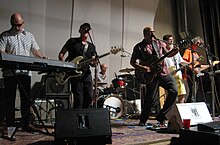Rain Parade
| Rain Parade | |
|---|---|

Rain Parade performing in San Francisco, September 2013
|
|
| Background information | |
| Origin | Los Angeles, California, US |
| Genres | Paisley Underground, psychedelic rock |
| Years active | 1981–1986, 1988, 2012–present |
| Labels | Enigma, Zippo, Island |
| Associated acts | Rainy Day, Opal, Viva Saturn, Gone Fishin', Mazzy Star |
| Members | Matt Piucci David Roback Steven Roback Will Glenn Eddie Kalwa John Thoman Mark Marcum Mark Hanley Alec Palao Gil Ray |
The Rain Parade is a band that was originally active in the Paisley Underground scene in Los Angeles in the 1980s, and that reunited and resumed touring in 2012.
The band was founded by college roommates Matt Piucci (guitar, vocals) and David Roback (guitar, vocals) in 1981, originally as The Sidewalks. David's brother Steven Roback (bass, vocals) joined the band shortly thereafter. David and Steven had been in a band called The Unconscious with neighbor Susanna Hoffs (who went on to lead the most famous of the Paisley Underground bands, The Bangles.) The band soon added Will Glenn (keyboards and violin) and later Eddie Kalwa (drums). They self-released their debut single, "What She's Done to Your Mind" on their Llama label in 1982.
In 1983, they released their debut album, Emergency Third Rail Power Trip, on the Enigma/Zippo label. Critic Jim DeRogatis would later write in his book Turn on Your Mind: Four Decades of Great Psychedelic Rock (2003) that "Emergency Third Rail Power Trip is not only the best album from any of the Paisley Underground bands, it ranks with the best psychedelic rock efforts from any era", with uplifting melodies offset by themes that were "dark and introspective." According to DeRogatis, the album showcased "the Robacks' ethereal vocals, Eddie Kalwa's precise drumming, Will Glenn's colorful sitar, violin, and keyboard accents, and an intricate, chiming, but droney two-guitar attack that picks up where the Byrds left off with 'Eight Miles High.'"
After David Roback left to form a new band, Opal, the rest of the band continued to record as a four-piece, releasing the mini-LP Explosions in the Glass Palace in 1984.NME would later write, in praise of Explosions in the Glass Palace: "Sound cathedrals? We got ‘em ... mind-meltingly beautiful guitar sounds, employed sparingly and dynamically amid dark, dizzy tales of murder, madness and drug paranoia." The song "No Easy Way Down" was cited as a "mantra for an altered state of mind, and testament to a band who, however fleetingly, made music that sounded like the best drugs ever."
...
Wikipedia
